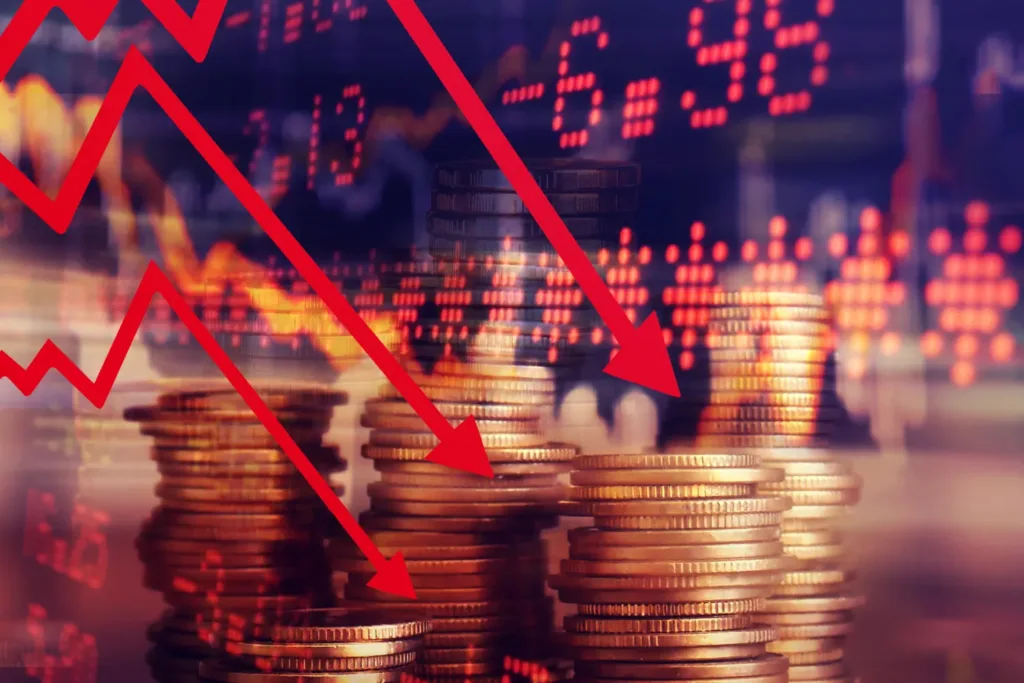Recessions are periods when the economy shrinks, affecting the jobs, spending, and financial well-being of millions. Typically lasting about 11 months, their impact and duration can vary widely.
Let’s dive into the nature of recessions, their effects on our lives, and practical steps to safeguard your finances, with a look at the stabilizing role of precious metals.
What Is a Recession?
U.S. recessions happen when economic growth slows and begins to shrink. Economists say it’s a recession when the country’s gross domestic product (GDP) — the total value of everything produced by all the people and companies in the country — goes down for six months straight or two consecutive quarters.
The National Bureau of Economic Research (NBER) serves as a referee for the U.S. economy — they call when a recession starts and stops, looking at income, employment, and sales. During a recession, consumers often buy less, and companies make less money, which can lead to job losses. The stock market might drop because investors are worried, and the Federal Reserve (the Fed) might cut interest rates to help the economy.
Recessions are a normal part of the business cycle, which is the economy’s instability over time. There have been many recessions, like the Great Depression, which was prolonged and severe, or the Great Recession after the 2008 financial crisis.
A recession is an economic slowdown that happens now and then, and even though it can be tricky, it doesn’t last forever. After a downturn usually comes a period of economic expansion and growth.
What Causes a Recession?
Think of a recession as when the economy takes a nap — it slows down, causing fewer jobs and sales to grow.
Many factors can cause this slowdown:
Too Much Spending: When consumers and businesses spend a lot, the economy can experience high inflation. The Federal Reserve might raise interest rates to relieve this. Doing it too much or quickly can make it hard for people to borrow money, leading to less spending and a significant decline in the economic cycle.
Stock Market Trouble: If stock prices fall or we experience a stock market crash, consumers and businesses may spend and invest less, leading to a recession.
Job Losses: When businesses suffer, they might lay off their workers, leading to high unemployment rates. When many citizens are out of work, they spend less, shrinking the economy.
Less Confidence: In anticipation of large-scale economic activity, families hold onto their money instead of spending it. This results in a lack of consumer confidence and may kickstart a recession.
Significant Events: A large-scale event, like a war, a massive natural disaster, or a pandemic, can hit the economy quickly and significantly, leading to a recession.
Business Cycles: The economy naturally goes through ups and downs. After a period of growth, there may naturally be a slowdown.
What Impact Does a Recession Have on Daily Life?
When a recession hits, daily life may get challenging for the average worker. Jobs might be fleeting as companies often slow retail sales or lay off employees, leading to more people looking for work. Paychecks might not stretch as far, with raises and bonuses becoming rare, and some folks could see their hours reduced.
Savings don’t escape the impact either — the interest rates on savings accounts generally stay the same, making the returns on your hard-earned money less rewarding. However, there’s a silver lining for those looking to buy a home. Lower interest rates can make borrowing cheaper, though getting a loan can be more challenging as banks become more cautious.
The nation’s mood can turn wary, too, as economic worries can lead to less dining out, traveling, and overall spending, affecting large and small businesses. It’s a cycle of caution permeating the country, but it’s important to remember that recessions do pass, and brighter economic times eventually return.
How Long Does a Recession Typically Last?
On average, American recessions have lasted about 11 months, according to the National Bureau of Economic Research (NBER). However, there’s a catch: The length may vary significantly.
Some recessions are short and over quickly — others can hang around longer. The Great Depression was the longest and deepest downturn in the 20th century, lasting over three years, while the recession following the dot-com bubble in the early 2000s was relatively short-lived.
Since World War II, the U.S. has seen more quick recoveries than long hauls, thanks partly to better responses from the Federal Reserve and government policies. The Federal Reserve might cut interest rates to make borrowing money cheaper, which can help jump-start spending and investment. The government might spend more or cut taxes to put more money in people’s pockets.
Every recession is different, and many things can affect how long they last, like how quickly businesses bounce back or how consumers feel about spending again.
What Factors Contribute to the Length of a Recession?
The length of an average recession can depend on a mix of different factors, including:
How Deep the Trouble Is: The recession could last longer if the economy’s problems are large, like a significant financial crisis. The larger the impact on the economy, the more likely the recession will last a while.
Response from the Federal Reserve: The Federal Reserve can step in to try and help by lowering interest rates. If they act fast and effectively, the recession might be shorter.
Consumer Confidence: The recession can drag on if people are worried and hold onto their money instead of spending it. Things can pick up quicker if they feel more confident opening their wallets.
Government Action: The action the government takes makes a considerable difference. If they spend money or cut taxes, it can give the economy a boost and shorten a recession.
Global Events: What’s happening in other countries may affect a recession in the U.S. If, for example, an oil price spike rattles trade or markets, it can make a recession stick around longer.
Real Estate and Credit Markets: If banks are tight with their funds, making it hard to borrow, or the housing market slumps, recovery may be slow.
Stock Market: The stock market can be a sign of how the economy is doing. If it’s down, it may lead to nerves for big investors and average consumers, making a recession last longer.
When Does a Recession Become a Depression?
The length and severity of the economic downturn marks the transition from a recession to a depression. A recession typically lasts a few months to over a year.
In a depression, the fallout is far greater, with a substantial decline in gross domestic product (GDP), widespread job losses, and a pervasive gloom that can deter consumer spending and business investment. Unemployment rates soar during a depression, and the pain is felt longer and more acutely across the economy.
Policymakers, the Federal Reserve, and the government can also influence whether a recession deepens into a depression. A lackluster or ill-conceived policy response can exacerbate the downturn. Similarly, a pervasive loss of confidence among consumers and businesses can lead to a self-sustaining cycle of reduced spending.
While both recessions and depressions are periods of economic hardship, the scale and duration of a depression are much more significant. Depressions are rare, and with modern economic policies and tools, central banks and governments aim to prevent recessions from spiraling into a far more devastating scenario.
How Do You Prepare for a Recession?
When preparing for a recession, it’s wise to start by building an emergency fund — a stash of cash that could cover your living expenses for several months. Reducing debt, especially with high-interest credit cards, might provide relief. Assess the security of your job, as some positions are more vulnerable during economic downturns — enhancing your skills or cultivating a side income can offer additional stability.
Scrutinizing your budget helps — understanding where your money goes can reveal opportunities to scale back on non-essentials.
Staying informed about economic indicators, such as the unemployment rate, stock market trends, and the Federal Reserve’s interest rate decisions, can guide your financial choices. If you’re contemplating a significant purchase like real estate, consider the timing, as prices often soften in a downturn.
How Can You Protect Your Finances?
Safeguarding your finances during a recession may prepare you for an economic downturn. Be smart with your budget — know what you need and what you can cut. Pay off high-interest debt quickly to avoid extra costs and diversify your investments across different areas like stocks, bonds, and precious metals to spread risk.
Ensure you have the right insurance coverage to protect against unexpected events. Keep your credit score healthy by paying bills on time and managing credit card balances. For big-ticket items, plan and save up rather than relying on credit.
Can Precious Metals Help Safeguard Your Financial Future?
Precious metals, like gold and silver, can be like knights in shining armor for your financial future. They’ve been valued for centuries and often hold their worth, especially during high inflation or economic downturns.
Having precious metals in your asset mix can be a good defense strategy — an excellent backup that doesn’t follow the same patterns as stocks or bonds. When the stock market fluctuates, precious metals often stand their ground or even increase in value.
People often see gold as a safe-haven asset: It’s something tangible you can hold onto, which can feel more secure when things are uncertain. If the value of money falls due to things like inflation, precious metals typically take the opposite track and go up in value.
The Bottom Line
Amidst economic downturns, understanding the typical pattern of a recession is critical to stability. Even though many shadows surround recessions, many strategies exist to secure your financial footing, from building emergency funds to wise investments. Precious metals stand out for their enduring value when included in the arsenal for economic defense.
Take the next step towards financial security — explore how American Hartford Gold can helpyou stay confident in times of economic downturn.
Sources:
Recession Definition: What Is A Recession? | Forbes Advisor
How to Prepare for a Recession: 6 Steps You Can Take Now | The Penny Hoarder






